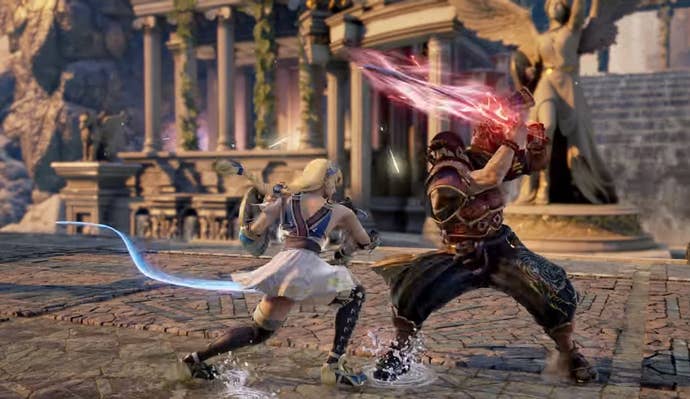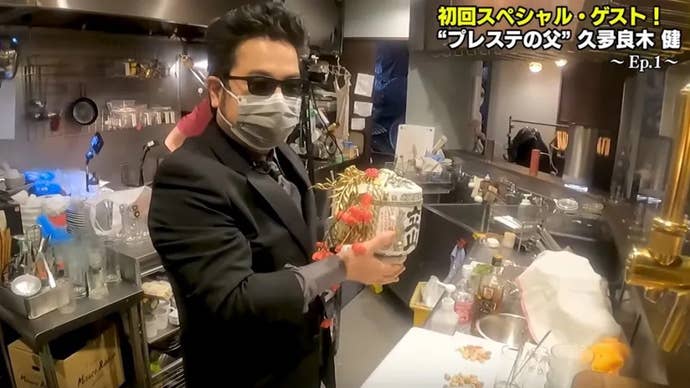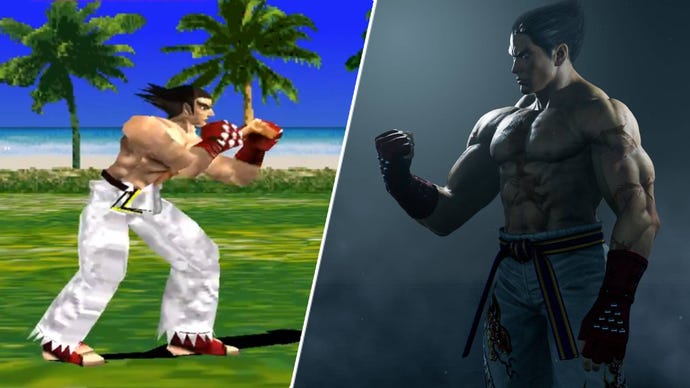It's been a long road for the Tekken series, so Harada and Michael Murray look back at the old days.
It's wild to think that Tekken has been around for 30 years, as long as the PlayStation itself. Though Tekken is now seen as one of the foundational IPs in the fighting game genre, that hasn't always been the case. The erstwhile 3D fighting series has observed the rise and decline of arcades, endured five console generations, sat through the rise of PC gaming, and spearheaded international online play whilst cultivating a community of fighting game fanatics over the decades. But why has it lasted so long where other games have fallen, and where does the series go from here?
To find out, I sat down in Red Bull Gaming Sphere to speak with Tekken 8 executive producer Katsuhiro Harada, and producer Michael Murray, about the past and future of the series, how they feel about being the only (prominent) 3D fighting game left, and how they feel about the halycon days of Tekken gone by. With Murray acting as translator, the full eye-opening conversation can be found below.
VG247: How do you feel after 30 years of Tekken?
Harada: When I was younger, I didn't really think much about the title having such a long lifespan, no matter how far I saw into the future at that age (which was only about 10 years). I was just trying really hard to catch up with rivals in the fighting game genre at the time. One of my regrets is that I was just so focused on catching up with them, and putting everything into each instalment, that a lot of the story setting and such was thought of 'on the spot' for each particular instalment. I wish I put more effort into the backbone of the story arc, if I knew it was going to last 30 years.
VG247: Tekken is certainly the most prominent 3D fighter right now. How do you feel being the 'last man standing', so to speak? Why has Tekken stood the test of time while others haven't?
Harada: It's kind-of sad that we're the only 3D fighting game, because 3D and 2D are just so drastically different. Back in the day, like you said, there were more games, but after a while you'd stop seeing them. With 2D fighters sometimes you'll see more indie developers creating them, but that doesn't happen with 3D fighters. So yeah, when you look around it's just Tekken, it's kind of unfortunate right?
 We've lost some real IP gems over the years.
We've lost some real IP gems over the years.
As for the reason why, I think it's because there are probably three pillars that set Tekken apart. That would be the actual creative side of it, which is done by the development team. Then there's the marketing, as well - how do we market the game worldwide effectively, etc. Then there's the community side of it!
Murray: It just so happens that, with Tekken, that was handled by both of us, you know, for the last 20 years or so. That's quite unique compared to other companies, because obviously we're part of the dev team. It's not like a marketing guy comes back and says 'hey this is what we should do because it's cool', we can just go back and say that we've been to a certain tournament abroad and saw a shift; maybe the arcades aren't as prevalent as they used to be in places outside of Japan, maybe the [expectations] shifted and people want more content with consoles or there are certain online features the community strongly wants. That's the stuff we were able to see first-hand, and we were able to quickly adapt and address the dev team on those kind of issues.
VG247: Do you miss the old days, 20-30 years ago? Obviously games are so expensive now, they take so long to make, the teams are so big. Do you have fond memories of those original Tekken days?
Harada: We miss those days so much, for a variety of reasons. One of the biggest ones is that games, like you said, are so much more expensive. That means we're spending more time on the games, too. In the past, it was easier to have an idea and to iterate it and have it in the game. Now, by the time the audience gets something, we've been developing it for a year after we thought of it. Back in the day too, everyone was playing on the same environment, whether it was an arcade machine or a console that was offline. Now, there are so many more opportunities to play on a PC or other consoles on a network. What that means is that if someone's playing with a PC, everything is different because of the components, or the network settings between players in different countries.
So it's so hard to troubleshoot when someone is having problems with the game than it was back in the day.
Murray: We'd both love to, you know, wake up and it be 15 years ago sometimes [laughs]. Harada also says that rather than AI creating art assets or music - the fun parts we'd rather do - he wishes that AI would help troubleshoot those problems with networking or PCs or whatever. If it could convince the board members to give us more budget, that would be nice too! [laughs]
VG247: What are your hopes for Tekken looking forward? What do the next 10, 20, or even 30 years look like to you?
Harada: It's really hard to tell. Myself and Murray, we might only have one more Tekken, thanks to age and how that plays out in Japan and development, and stuff like that. 20-30 years is a long time, so you might have another team, that's just the way companies work, right? It's kind of unique with the Tekken team, even if you take the two of us away, there's still the director and people who are leaders on the team, we're all in a similar age range. It's kind of unique that everyone on the team has been on the team for at least 20 years, in most cases. So, it could turn into quite a different game after we're gone. It could be more casual, who knows? It could be like Smash Bros!
 What will the future of senior Tekken devs like Harada hold? Maybe some more time at the bar. | Image credit: Harada
What will the future of senior Tekken devs like Harada hold? Maybe some more time at the bar. | Image credit: Harada
I'm quite worried honestly because there are various factors in making a game. So, obviously, there's the board of the company, and the finance people with their goals and such for the game financially and how it relates to the company. They're naturally quite strong, as you would imagine. So it's very important to have a creative side where people know the game well and know what it needs to be.
But there has to be a voice strong enough [on the development team] to be on the same kinda floor as those people. So my worry is that if you have a creative side that doesn't have the same footing as those people running the company... I worry about how that'll play out.
VG247: So you're worried that once yourself, Murray, and other senior leads on the creative side leave the strength on the creative side will fade a bit?
Harada: Yeah. It's a difficult balance, realistically, because if the creative side is stronger than the board of the company side - that happens sometimes, right - then the company might not survive [laughs] So, it is a delicate balance.
VG247: Michael, you've been around since the Tekken 4 days, why do you think the series has stood the test of time?
Murray: Okay! I've said this before to the community; Tekken is a lot of things to a lot of people. Often when you try to be everything for everyone, it doesn't turn out well. But with Tekken, I think we have a good balance of trying to provide for the hardcore fans, while having story and bonus content to keep casual fans occupied. I think we've had a good balance of trying to provide a lot of content in one package.
But, like Harada said, a core group of team leaders being able to direct the game as a whole and have that direct input after visiting so many tournaments worldwide, where elsewhere there's such a disconnect with other companies that I see, all the different stakeholders and the dev team. Our team sees, literally, people enjoying the game when we take them to Evo or other tournaments. It gives us a lot of ideas, interacting with the community. As you saw with Tekken 7 and the slow motion. Even the trailers! We have a good sense of what people will do at Evo when they see them. I think we do that maybe better than others, and it's a key to success.
Tekken 8 is out now on PlayStation 5, Xbox Series X/S, and PC. Heihachi, the next DLC character, is set to release on October 3.

 4 months ago
94
4 months ago
94








![Anime Reborn Units Tier List [RELEASE] (November 2024)](https://www.destructoid.com/wp-content/uploads/2024/11/anime-reborn-units-tier-list.jpg)
